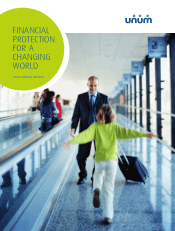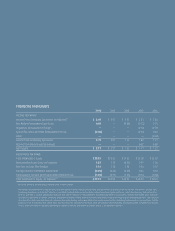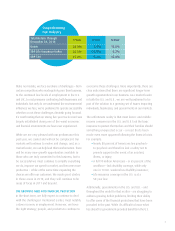Unum 2010 Annual Report Download - page 6
Download and view the complete annual report
Please find page 6 of the 2010 Unum annual report below. You can navigate through the pages in the report by either clicking on the pages listed below, or by using the keyword search tool below to find specific information within the annual report. 4
and U.K., what is clear is that neither government is
likely to increase benefits. Instead, they will almost
certainly ask citizens to take more responsibility for
protecting their own financial security.
Employer-sponsored benefits can play a major role
in addressing the need for financial protection and
in taking the pressure off government resources.
According to recent economic studies, the protection
provided by employer-sponsored disability insurance,
for instance, means that as many as 430,000 families
each year in the U.S. are not relying on public assistance
programs. This translates into a savings to the govern-
ment and taxpayers of up to $3.5 billion a year. The
estimates for life insurance are even higher, but the
point is the same: The social welfare gain for both
consumers and the government would be much
greater if more people had access to financial pro-
tection coverage, especially at the lower- and
middle-income levels.
With this in mind, benefits providers must – in
partnership with employers and policymakers – step
forward to help solve the problem of a large and
rapidly expanding population without the financial
resources to protect themselves or their families in
the event of death, illness, or injury.
Our research and industry data indicate that while
some consumers have access to financial advice and
sound choices to protect themselves, the vast majority
do not – and in fact are looking to their employer for
help. While employers are naturally concerned
about cost pressures, they still see the value to their
employees and to their businesses of providing financial
protection benefits. In fact, most believe they have a
responsibility to protect employees’ and their families’
well-being. The facts are compelling:
• More than 80 percent of human resources
executives say the key to keeping employees
engaged and motivated is to demonstrate
that the company cares about their well-being,
and one of the ways they can do that is
by providing access to a well-rounded
benefits package;
• More than 70 percent of life insurance and
80 percent of disability insurance is pur-
chased in the workplace;
• Middle- and lower-income families, in
particular, are dependent on the workplace
for benefits.
In short, we believe the workplace is extremely
important today and, in the future, will become
an even more significant marketplace for providing
working people of all income levels access to
quality, high-value protection for themselves and
their families.
A CULTURE OF RESPONSIBILITY
As proud as I am of our financial results, I take even
greater pride in the often-unnoticed actions of our
people that define Unum’s culture as one of caring
and striving to consistently do the right thing. Our
people are highly engaged in the business, and as a
result they make good things happen for all of our
stakeholders. It begins with living up to our commit-
ments to policyholders. In 2010, that meant paying
approximately $6 billion in benefits to individuals and
families during some of the most difficult times of their
lives. Also ingrained in our company is the culture of
responsibility we’ve fostered over the years. Our
customer, broker, and claimant satisfaction numbers
are at record levels and climbing. And we continue
to believe that we have a significant role to play in
assisting those less fortunate and in making our
communities better, especially through our efforts
to improve public education. Last year alone, Unum
donated more than $7 million to charitable organiza-
tions throughout the U.S. and U.K., including more
than $1.2 million of employee contributions through
our matching gifts program. We also advanced our
commitment to good corporate citizenship by making
further reductions in our carbon footprint. We recycled
more than 3 million pounds of paper and cardboard
and, since 2008, reduced our energy consumption by
15 percent.



















